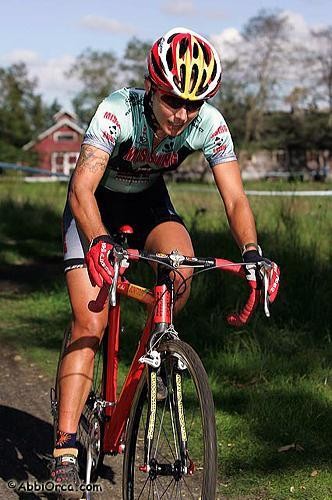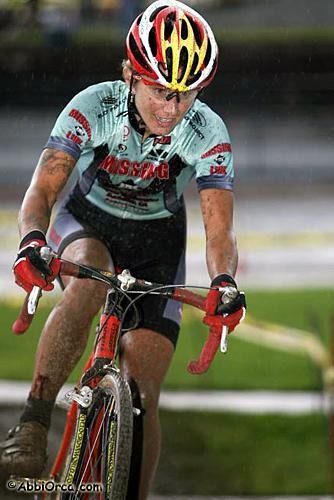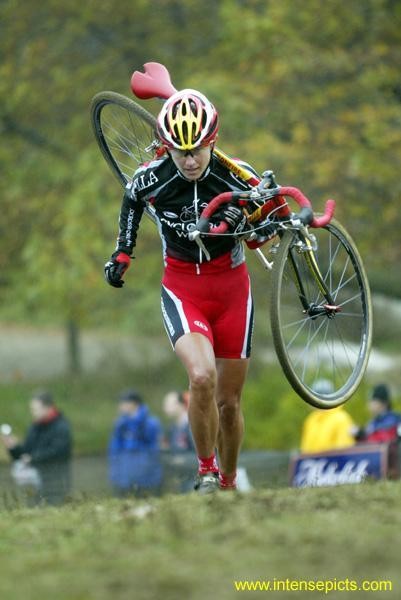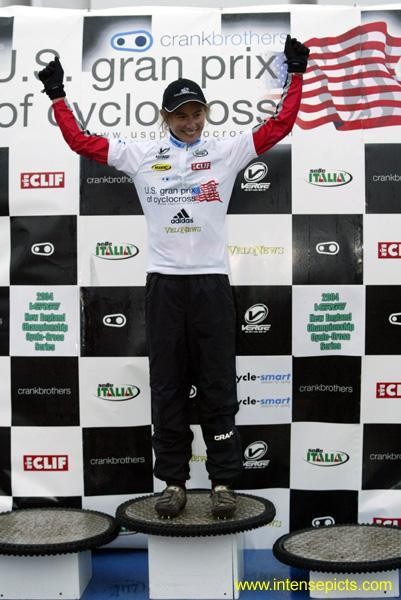Retiring from cyclocross (again and again)
For Gina Hall, cyclocross is like some sadistic force, an unexplainable gravitational energy,...




An interview with Gina Hall, December 14, 2004
Retiring from cyclocross (again and again)
For Gina Hall, cyclocross is like some sadistic force, an unexplainable gravitational energy, directed specifically at her, that keeps sucking her back to the sport no matter how many times she tries to quit. Cyclingnews' Steve Medcroft talked with the seven-year pro from Northern California while she worked in some warm-weather prep in the Bay area before nationals - to find out of she thought she'd ever be able to break free of cyclocross.
Last year, Gina Hall got so serious about her 'retirement' that she and her Clif Bar teammate Carmen D'Aluisio conducted an informal farewell tour. Since then, she's put racing behind her, moved to a new city and embarked on a life of living and working and only riding her mountain bike for fun.
But then, for fun again, she decided to race the U.S. Gran Prix of Cyclocross opener in Portland. She placed second. Then she won the second day, which meant she was leading the series. And not showing up for the third race would have been disrespectful to the sport that had been such a big part of her life and the competitors who actually had their hearts and souls in this season.
What that evil cyclocross vortex has done with Hall since is give her second place in the USGP series, a couple of Northern California UCI wins and a place on the start line for the national championships, where she finished second today behind Colorado racer Katie Compton.
Cyclingnews: You've been racing for a while, but you're not exclusively a cyclocross racer, right?
The latest race content, interviews, features, reviews and expert buying guides, direct to your inbox!
Gina Hall: I was a pro mountain biker on various teams for about 10 years. Which is really how I got started in the whole racing thing. I had been 'cross racing about seven or eight years for fun and to keep fit for mountain biking. In my last season mountain bikng, I raced with the Luna team. One of my teammates started up the Clif Bar cyclcross team, so I switched my attention full time to 'cross. That was two years ago. I love cyclocross. I grew up in the Bay area and we have a really good series here (Surf City Cyclocross). There's a ton of 'cross racing here.
CN: You're using the word 'here' in reference to Northern California but you're actually based in Oregon, aren't you?
GH: Yeah, you're right. I live in Ashland, although I'm in the Bay area right now, in Berkeley. Which is where I used to live until about five months ago. I keep referring to it as my home but I don't live here anymore. The winter has been a bit of a struggle, to be honest with you. In the Bay area, we really don't get our weather until later on in the season and the most we get is a bunch of rain. The 'cross racing here is never horrendous. There's never a terrible mud bath like further north. Every once in a while we'll get a muddy race. I mean one. Then you clean your bike and it's nice again. Up in Ashland this year, it's been very cold. It has actually snowed already, so I've found it challenging to get out and train.
CN: So you're hiding in the Bay area?
GH: I ran back, tail between my legs (laughs). Anyway, as for 'cross racing - last year was the final year of the Clif Bar team. We had a great team and did really well for two years. Carmen D'Aluisio and I went to Belgium as part of a training camp. Then we stayed over and raced in Belgium and France before meeting up with the national team to do the world championships. That couple of months in Europe really developed our 'cross skills and racing technique.
CN: I hear you can almost make a living at it over there too?
GH: You can. Even the women. I think it's the start money that does it. Their prize money is probably not even as good as our prize money, which is not great, but they get start money. Like Daphny Van Den Brand, she gets good start money. What you get is probably based on your previous season. Daphne's been a world champion. Carmen and I were the top ranked U.S. women at the time, which was good for the promoters. So they paid us to start.
CN: They like to have Americans on their start lines?
GH: I think it was kind of a novelty. It may have even been the first time that two U.S. women have come over so early and for that length of time, so they were excited. Just to be clear though, several U.S. women have gone over and done races. But there's a time between Christmas and New Year's when there are 'cross races almost every day in Belgium and Holland. Carmen and I were trying to hit that season for experience. And it paid off. Racing over there is a lot different than racing here: courses are different, the competitors are harder and there are more of them. Every race, even the little ones, would be a challenge. We'd go to these little tiny races in Holland and the road world champion would show up for example. I'd be like, 'Oh great. How about an easy race for once?' It was awesome.
CN: Speaking of bad winter weather, you probably saw some miserable conditions over there?
GH: We did. Cold mostly. We would sit in the car and watch the temperature drop on the thermometer as the race drew closer. It took a while to get used to that.
CN: And everything sounds so much colder in Celsius.
GH: I know. 'It's one degree. Oh my God!' It wasn't too awful though - the way race promoters set things up over there is much more accommodating to the weather conditions. They have to have a shower available to the riders post race, for example; a hot shower. That's essential. You also learn to warm up in one set of clothes then change into something dry to stay warm for the race.
CN: If a young American women who is doing well in cyclocross wants to go to Europe and race, how should she go about it? Just buy a ticket and go?
GH: Definitely not. This is what we did - Jeff Proctor (2003 U.S. men's junior and espoir team manager) set up a training camp at the U23 USA Cycling house, the one that Noel Dejonckheere stays in. Jeff set this up to give U.S. riders an opportunity to go to Europe and see their competition. If a rider wanted to go, I would recommend they get connected with a program like Jeff's.
CN: What was your fist experience with cycling?
GH: It wasn't until I moved to San Francisco to go to San Francisco State. I bought a mountain bike, an MB3 (Bridgestone), just for casual riding. Then a housemate moved in with us and she had exactly the same bike. We became instant riding buddies. There used to be singletrack trails in Golden Gate Park and we'd go down there and play around. We also met up with a group of bike messengers and we'd ride over the Golden Gate Bridge to the Marin Headlands. It was a lot of fun.
CN: Bicycles were transportation too?
GH: Absolutely. I rode to school. I didn't have a car.
CN: How were you introduced to racing?
GH: That same housemate. We used to have these big classic races here, like Revenge of the Siskiyous. My roommate went up and did one and when she came back, she talked about how fun it was so I thought I'd give it a try. I entered as a sport racer and won my first race. I was in school and thought this was a fun diversion and I had a blast. These were casual races - you'd go up with your friends and camp out. After racing, the promoter would put on a big spaghetti feed. I ended up doing well. I turned pro and was sponsored by Joe Breezer and raced for the Breezer team. I think I was 29 or 30. I did it for the challenge - to see how I would do in the pro race. I never, ever planned on racing professionally. Once I turned pro though, I had to take it seriously.
CN: Did you make a living at it?
GH: No, I didn't. I worked at Pete's Coffee and Tea pretty much the whole time I was racing, as a barista. I quit Pete's when I joined the Luna team because I didn't need the work for a little while, although they come in handy here and there - I've gone back for a month or two at a time. It's a great company to let me do that.
CN: Your tattoos are very distinctive. What's the story behind the design?
GH: I had them done in Berkeley. I wanted to get a tattoo and I really like flowers so I originally got two sunflowers. I added the hummingbird and other stuff later on. I wanted to make it a band that went all the way around the arm so I added flowers that hummingbirds would actually eat - they don't eat sunflowers.
CN: Is it a work in progress? Is it still growing?
GH: No. This is it. It's very painful. It's an addiction, I know. I know that when I first got it I immediately wanted to get more. But it also hurts so much that I think this will probably be it. Maybe one more.
CN: Famous last words?
GH: I know (laughs). I can never say. It's just like how I retire every year and end up racing again.
CN: Are you retiring this year?
GH: Last year was my official retirement. Carmen and I even did what we called a farewell tour with the Clif Bar team. I've always felt that when I plateaued in racing, it would be time for me to stop and move on to something else. I felt like I had reached that point so then this year I moved up to Ashland to break away from the whole cycling scene, to do something else. Ashland is pretty small. I went there to work on a house that I bought. Then Ann Grande (Knapp) came to visit and we did some mountain biking. She talked me into racing again. I did it really casually. I was like, 'Well, I'll just go see how I do.' I didn't commit to anything more than that. I didn't have any sponsorship for those first two Crank Brothers (U.S. Gran Prix of Cyclocross) races either. I got second in the first race and won the second day. Bruce (Fina), the guy who was promoting it said 'you have a leader's jersey so you have to go to the next one.' At that point I was dragged back into it. So I figured I might as well get serious.
CN: And from there, you had a great season?
GH: It's gone well actually. Now I'm headed to nationals.
CN: With your kind of luck, you're probably headed for World's too?
GH: I'm still keeping a wait-and-see attitude. It's $3,700 if you don't get the automatic selection and I don't have the resources to go without that, so I'm not sure I could go even if I get selected.
CN: You've been to World's how many times?
GH: Three. It's such an unbelievable experience, not like anything you could experience here. The crowds are huge and fanatical. I went to the Belgium world championships the first time and there were 50,000 spectators. I cracked just at the sight of all those people. They were leaning into the course, three deep the entire way. You couldn't hear anything because the noise was deafening. They are just so enthusiastic about cyclocross. Especially in Belgium. They went insane that the World's were there.
CN: Is it uncomfortably crowded? Did you feel safe?
GH: That one was. I was really stressed out about the crowds. I had never seen anything like it. I've done some World Cup races in Europe where there were people all over the course but nothing like that. It was exciting. But really nerve-racking.
CN: And probably did your heart rate no good?
GH: I remember just trying to get to the course. Ann (Knapp) and I were riding over and it was hard even to get through the crowds. She ran into this group of Belgians that have kind of been following her - her fans. It was almost impossible to distract them from having her take pictures with them.
CN: I would assume, after all this, you actually plan to retire this time?
GH: I'm definitely retiring this time. I've come to that conclusion after a year of racing in semi-retirement. I'm going back to school. I love my bike. I'll always ride my bike. I'll always have a cross bike and a mountain bike and I'll probably commute on my bikes but I don't plan on racing any more.
CN: What are you going to school for?
GH: I'm taking some biology courses, so either a degree in biology, or I'm going to go to a two-year vet technician's program. I need a degree that leads me to a flexible job.
CN: What would you do with that flexibility?
GH: The ideal life for me is to keep having time to do sports - it doesn't necessarily have to be riding my bike - I'd like to do kayaking, I used to scuba dive. I love hiking and backpacking. I love anything outdoors. And traveling. I don't want to get tied down to a job where I can never get time off, never experience life. There are so many things to go do.
CN: This sounds a lot like the job of a full-time professional bike racer. You sure you're retiring?
GH: I mean it this time (laughs) But you're right about the cycling lifestyle. It ruined me. I've lived so freely, I just can't imagine being stuck somewhere. It frightens me, the idea of having some eighty-hour a week job. Life's too short and there are too many things to do. I need to find work that allows me that flexibility.
Other Talking Cycling Interviews
